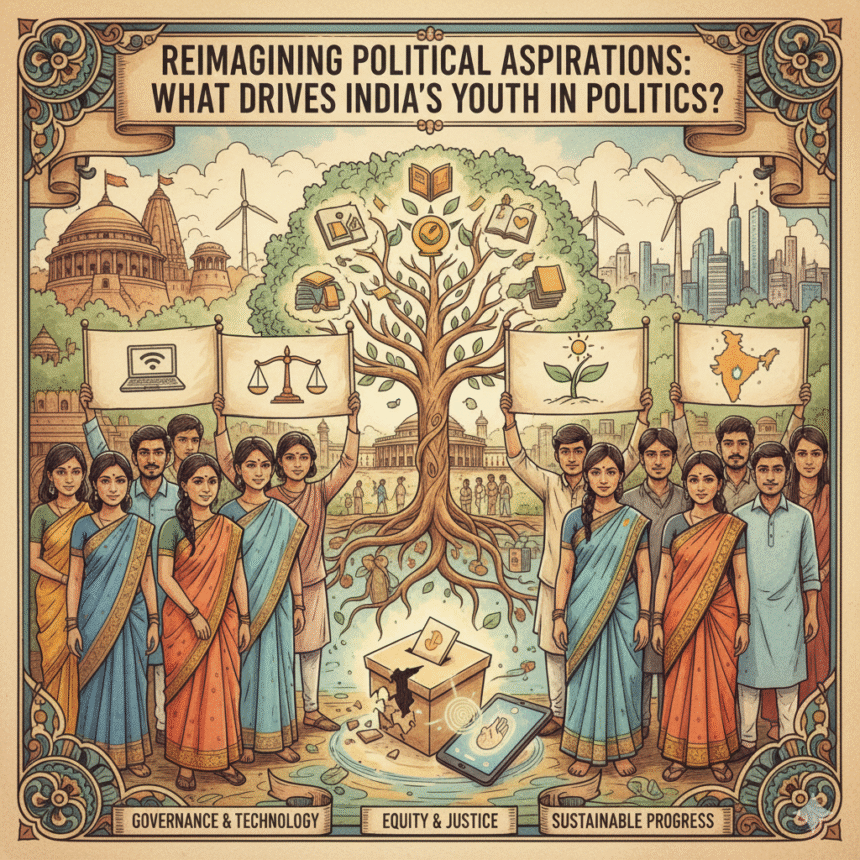Survey Highlights a Shift in Perception: Are Young Indians Entering Politics for Power or Change?
Key Insights
- Survey Results: A 2025 Lokniti-CSDS study reveals that 64% of young Indians view politics as a means of personal success rather than societal transformation.
- Growing Concerns: Experts worry about a shift in youth motivations from activism to enjoying the perks of political power.
- Need for Reform: Political analysts emphasize structural changes to restore politics as a platform for public service.
Introduction
In a democracy as vibrant as India’s, the role of youth in shaping the nation’s political future has always been pivotal. However, a new 2025 survey by Lokniti-CSDS has raised critical questions about the motivations driving young Indians to enter politics. The findings indicate a significant shift from a focus on activism and change-making to an emphasis on personal success and power. This development has sparked widespread debate on the future of political leadership in the country.
Survey Reveals Changing Motivations
According to the Lokniti-CSDS study:
- 64% of Respondents: Believe politics is now seen primarily as a career offering power and perks rather than a platform for societal change.
- 72% of Young Indians: Feel that political success today is heavily influenced by wealth, nepotism, and connections.
- Only 36%: Identified public service and grassroots activism as primary motivations for entering politics.
These figures underscore a growing disconnect between the ideals of politics and the realities of political engagement among the youth.
The Lure of Power
1. Politics as a Shortcut to Success
For many young Indians, politics has become synonymous with influence and affluence:
- Economic Benefits: An ADR report from 2024 highlighted that 70% of India’s sitting legislators declared assets worth over ₹1 crore, showcasing the financial advantages associated with political careers.
- Social Status: The visibility and prestige of political office continue to attract young aspirants, particularly those from privileged backgrounds.
2. Dynastic Politics
- Statistical Dominance: Political dynasties still hold sway, with 28% of MPs in the current Lok Sabha belonging to political families.
- Barrier for Outsiders: Young leaders from non-political backgrounds often struggle to break into this elite club, further reinforcing the perception of politics as an exclusive domain.
Concerns Among Experts
1. Shift Away from Activism
Political analysts point to a worrying decline in grassroots activism among youth.
- Historical Contrast: Movements like the anti-corruption protests in 2011 saw significant youth participation, driven by ideals of change.
- Current Scenario: Experts argue that today’s youth are more focused on leveraging political office for personal gains.
2. Impact on Governance
- Policy Focus: A shift in motivations could lead to governance prioritizing short-term gains over long-term reforms.
- Public Trust: Widening the gap between citizens and leaders risks eroding trust in democratic institutions.
Steps Toward Reform
1. Transparency in Political Funding
- Mandating full disclosure of campaign finances can reduce the influence of wealth and corporate backing in politics.
2. Supporting Independent Leadership
- Initiatives like Youth Parliament and grassroots training programs can empower young leaders from non-political backgrounds.
3. Encouraging Ethical Leadership
- Highlighting the success of leaders like Chandrashekhar Azad and grassroots activists can inspire youth to prioritize public service.
Conclusion
The findings of the 2025 Lokniti-CSDS survey highlight a critical moment for India’s political future. As the motivations of young aspirants shift from change-making to power-seeking, the nation faces the challenge of realigning its political culture with the ideals of democracy. Restoring faith in politics as a platform for public service will require systemic reforms, greater transparency, and a renewed focus on grassroots engagement. The question remains: Can India’s youth redefine political aspirations and lead the country toward a more inclusive and ethical future?


Leave a Reply